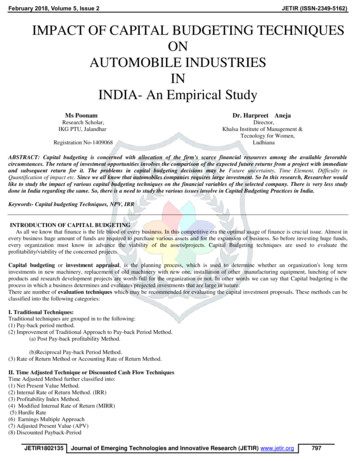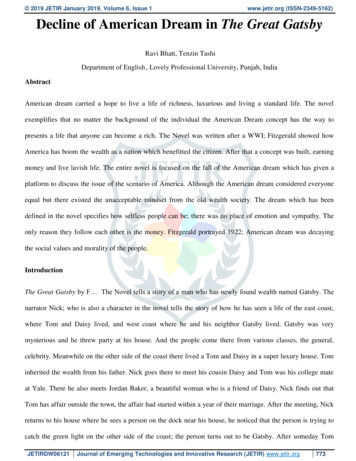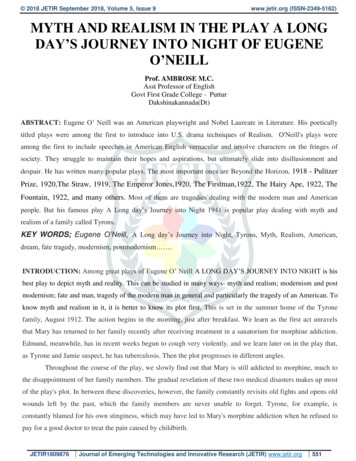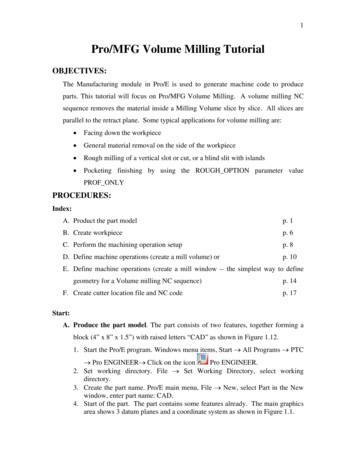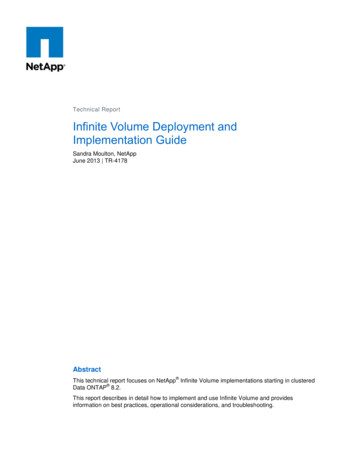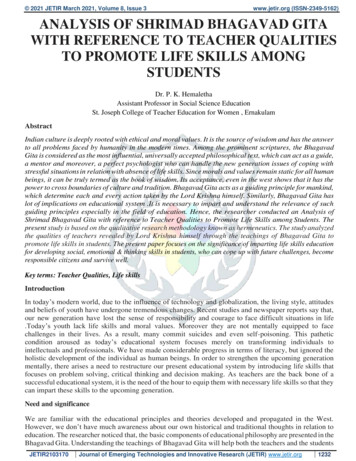
Transcription
2021 JETIR March 2021, Volume 8, Issue 3www.jetir.org (ISSN-2349-5162)ANALYSIS OF SHRIMAD BHAGAVAD GITAWITH REFERENCE TO TEACHER QUALITIESTO PROMOTE LIFE SKILLS AMONGSTUDENTSDr. P. K. HemalethaAssistant Professor in Social Science EducationSt. Joseph College of Teacher Education for Women , ErnakulamAbstractIndian culture is deeply rooted with ethical and moral values. It is the source of wisdom and has the answerto all problems faced by humanity in the modern times. Among the prominent scriptures, the BhagavadGita is considered as the most influential, universally accepted philosophical text, which can act as a guide,a mentor and moreover, a perfect psychologist who can handle the new generation issues of coping withstressful situations in relation with absence of life skills. Since morals and values remain static for all humanbeings, it can be truly termed as the book of wisdom. Its acceptance, even in the west shows that it has thepower to cross boundaries of culture and tradition. Bhagavad Gita acts as a guiding principle for mankind,which determine each and every action taken by the Lord Krishna himself. Similarly, Bhagavad Gita haslot of implications on educational system .It is necessary to impart and understand the relevance of suchguiding principles especially in the field of education. Hence, the researcher conducted an Analysis ofShrimad Bhagavad Gita with reference to Teacher Qualities to Promote Life Skills among Students. Thepresent study is based on the qualitative research methodology known as hermeneutics. The study analyzedthe qualities of teachers revealed by Lord Krishna himself through the teachings of Bhagavad Gita topromote life skills in students. The present paper focuses on the significance of imparting life skills educationfor developing social, emotional & thinking skills in students, who can cope up with future challenges, becomeresponsible citizens and survive well.Key terms: Teacher Qualities, Life skillsIntroductionIn today’s modern world, due to the influence of technology and globalization, the living style, attitudesand beliefs of youth have undergone tremendous changes. Recent studies and newspaper reports say that,our new generation have lost the sense of responsibility and courage to face difficult situations in life.Today’s youth lack life skills and moral values. Moreover they are not mentally equipped to facechallenges in their lives. As a result, many commit suicides and even self-poisoning. This patheticcondition aroused as today’s educational system focuses merely on transforming individuals tointellectuals and professionals. We have made considerable progress in terms of literacy, but ignored theholistic development of the individual as human beings. In order to strengthen the upcoming generationmentally, there arises a need to restructure our present educational system by introducing life skills thatfocuses on problem solving, critical thinking and decision making. As teachers are the back bone of asuccessful educational system, it is the need of the hour to equip them with necessary life skills so that theycan impart these skills to the upcoming generation.Need and significanceWe are familiar with the educational principles and theories developed and propagated in the West.However, we don’t have much awareness about our own historical and traditional thoughts in relation toeducation. The researcher noticed that, the basic components of educational philosophy are presented in theBhagavad Gita. Understanding the teachings of Bhagavad Gita will help both the teachers and the studentsJETIR2103170Journal of Emerging Technologies and Innovative Research (JETIR) www.jetir.org1232
2021 JETIR March 2021, Volume 8, Issue 3www.jetir.org (ISSN-2349-5162)to perform their duties well. So it is the responsibility of educational institutions and teachers to assiststudents in developing the desirable characteristics of moral values and inculcating life skills whichprovides strength to face all difficult situations in real life.The significance of life skill education has been pointed out by WHO and UNICEF. The life skill educationcan produce powerful behavioral outcomes, especially where this approach is supported by other systems.“Life skills education is designed to facilitate the practice and reinforcement of psychosocial skills in aculturally and developmentally suitable way; it contributes to the promotion of personal and socialdevelopment, the prevention of health and social problems, and the protection of human rights” (MHP).Being a teacher for the past thirty years, the investigator could see the absence of life skills among today’sstudents. They do not possess the skills to face challenges in life. Being over sensitive to situations, theyslip on to unfair methods like drugs, sex and violence. Out of this crisis situation, the number of suicidesand crimes are increasing day by day. Though we are educating students through talks and seminars, therearises a necessity to stick on to a book of wisdom, which explores both morality as well as life skills. Theinvestigator has taken classes on Bhagavad Gita and had experienced its practical philosophy. Thereforeanalyzing Bhagavad Gita to explore the teacher qualities and extract the life skills to nurture students willcertainly help the educators to a large extend. Even if the situation of the Bhagavad Gita was created onbattle field before the commencement of the war, its relevance in present context especially in the field ofeducation is still meaningful and considerable.The researches conducted on Shrimad Bhagavad Gita withreference to educational implications are limited. So the investigator has decided to conduct the presentstudy, which seems to be novel in this field.Statement of the ProblemBhagavad Gita has lot of implications on educational system and it is necessary to impart and understandthe relevance of such guiding principles especially in the field of education. Hence, the present study isentitled as Analysis of Shrimad Bhagavad Gita with reference to Teacher Qualities to Promote LifeSkills among Students.Definition of Key termsAnalysis- The detailed examination of the elements or structure of something is called Analysis (Oxforddictionary).Shrimad Bhagavad GitaThe Bhagavad Gita known as the “Song of the Lord" is part of the great epic Mahabharata, the world'slongest poem. This sacred ancient scripture of India is composed between 500 BCE and 100 CE. TheBhagavad Gita takes the form of a discourse/dialogue between the great warrior prince Arjuna and LordKrishna his charioteer just before the war is about to begin.Teacher QualitiesTeacher qualities include knowledge, attitudes, behaviours, and skills that teachers require to perform theirtasks effectively in the classroom, school, and wider community. Teacher quality is the most significantfactor that influence the learner and learning outcomes.When examined from an educational perspective, the verses of the Bhagavad Gita depicts the qualities ofan ideal teacher as revealed by Krishna himself in the Kurukshethra battlefield to guide his student Arjuna,who strives for his help and guidance in overcoming the deviation of mind and sustain focus toward theduties that are expected of him.Promote - support or actively encourage (a cause, venture, etc.); further the progress of, to help somethingto happen or develop (Oxford).To elevate, the mind, the body and the soul of an individual to a specific levelor to encourage and develop something.Life SkillsLife skills: Life skills have been defined as “the abilities for adaptive and positive behaviour that enableindividuals to deal effectively with the demands and challenges of everyday life” (WHO). The core life skillsselected (laid down by WHO) for the study were Self-awareness, Empathy, Critical thinking, Creativethinking, Decision making, Problem Solving, Effective communication, Interpersonal relationship, Copingwith stress and Coping with emotions as revealed through teachings of Bhagavad Gita and are to be nurturedin students in accordance with the teachings of Bhagavad GitaJETIR2103170Journal of Emerging Technologies and Innovative Research (JETIR) www.jetir.org1233
2021 JETIR March 2021, Volume 8, Issue 3www.jetir.org (ISSN-2349-5162)StudentsStudents are those who have desire to know and to learn. Those who do not consider learning as mere ladderto success and they must have an inherent, burning desire of being perpetually curious. Students arededicated learners, where age is not a constraint.Objectives1. To explore the qualities of an ideal teacher revealed by Lord Krishna himself through BhagavadGita2. To extract the essential life skills that is to be nurtured in a dutiful student in accordance with theteachings of Bhagavad Gita.3. To integrate the qualities of an ideal teacher derived from Shrimad Bhagavad Gita with the life skillsof students to be promoted by the teacher.MethodologyIn the present context, hermeneutics can be described as the understanding and interpretation of a sacredancient Indian Scripture. The sacred ancient scripture of Bhagavad-Gita was analysed by using thehermeneutic method. The slokas in the sacred scripture was analysed in the social context. Arjuna’s mindsetand Krishna’s console as an ideal teacher was compared to the mind set of students and role played bypresent teachers in promoting the life skills which will equip them to meet the challenges ahead in life whichare relevant in the current teaching learning practices and also to address some of the crucial aspects ofeducation.Analysis and InterpretationLord Krishna speaks the timeless wisdom of the Bhagavad-Gita to help Arjuna out of his depression andbring him back to spiritual consciousness. These inspirational talks with Krishna cure Arjuna of hisdesperate anguish and permit him to act according to the Lord’s instructions. Lord Krishna, his friend andphilosopher, intervened and gave him wisdom that steered Arjuna the warrior king to action. LordKrishna's teachings to Arjuna emphasized that all wars first begin in the mind and thus winning in themind is the first step to winning on the battlefield and in real life. More than 100 slokas were identifiedand analysed based on the objectives of the study and only five of them are described as follows;Life skills in Shrimad Bhagavad Gita (Core Life Skills laid down by WHO, 2001)1. Problem Solvinghato vā prāpsyasi swargaṁ jitvā vā bhokṣhyase mahīmtasmād uttiṣhṭha kaunteya yuddhāya kṛita-niśhchayaḥIn the chapter 2 Sankhya Yoga -verse 37, Shree Krishna is still giving instructions at the level of occupationalduties. He reveals to Arjuna about the two possibilities arising from the conduct of his duty. If Arjuna becomesvictorious, a kingdom on Earth awaits him, and if he is enforced to surrender his life in the discharge of hisduty, he will go to the celestial abodes. Lord Krishna points out that there is a solution for every problem andit is our choice which determines the right action.Implications- Every problem has a solution.Problems are an inevitable part of human life .How we approach these worries is the matter of concern. Theskill of problem-solving arises from choices. Rather than surrendering oneself before the complications, howto choose the correct solution to overcome the trouble should be considered. There is nothing in life without aremedy. The above verses say about how problems can influence the lives of human beings. If one surrendersbefore the problem, he will end up in drastic destruction of oneself. In contrary to that Lord says in the nextverses stating examples to Arjuna about fighting in the war. Whether he wins the battle or dies in the battle,both have its outcome. Instead, surrendering before the issue is not the solution. Hence, Vasudev states that oneshould explore through different choices and never breakdown when you encounter with it. The teacher in theclassrooms facilitate children to face challenges in the 21st century and solve the problems by themselves.2. Self-Awarenessnādatte kasyachit pāpaṁ na chaiva sukṛitaṁ vibhuḥajñānenāvṛitaṁ jñānaṁ tena muhyanti jantavaḥIn chapter 5 Karma Sanyasa Yoga verse 15, Lord Krishna says that God is not responsible either for anyone’sJETIR2103170Journal of Emerging Technologies and Innovative Research (JETIR) www.jetir.org1234
2021 JETIR March 2021, Volume 8, Issue 3www.jetir.org (ISSN-2349-5162)virtuous deeds or sinful actions. God’s work in this regard is threefold: 1) He provides the soul with the powerto act. 2) Once we have performed actions with the power provided to us, He notes our actions. 3) He gives usthe results of our karmas. So, we are responsible for our destiny. Man creates his happiness and sorrows.Implications- it is very important for students to understand the power of oneself.An ideal student should have a mind to know about oneself. Self-awareness happens if one attains confidence todo and perform actions. Man is a manifestation of God himself. He is a part of God and therefore he has immensepotentials to face all crises that arise in life. Understanding self will help an individual to measure his own strengthand weakness, identify the crisis times and take an action. One should never degrade one’s powers or abilitiesand if done so you are killing your mind, body and soul. In the above verses, Madhav says to Arjuna that Godhas given ability all human beings that are in the form of power supplied to the soul to act. Then according to thataction, one gets the desired result. So, to act in the right way, one should have self- awareness. Therefore, it isevident that life skill- self-awareness is explained by Krishna through these verses. It is the duty of the teachersto equip students with skills of self-confidence and self-awareness.3. Decision Makingyatroparamate chittaṁ niruddhaṁ yoga-sevayāyatra chaivātmanātmānaṁ paśhyann ātmani tuṣhyatiIn chapter 6 Dhyana Yoga verse 20, having presented the process of meditation and the state of its perfection,Shree Krishna now reveals the results of such endeavours. When the mind is purified, one can perceive the selfas distinct from the body, mind, and intellect. For example, if there is muddy water in a glass, nothing can beseen through it. However, if we put alum in the water, the mud settles down and the water becomes clear.Similarly, when the mind is unclean, it obscures the real aim of life. Therefore, meditation helps an individualto attain purity in mind which helps the brain to make the right decisions.Implications- Right thoughts results in right action. A disturbed mind will never formulate the right decisions.If mind is disturbed, the decision that we take seems unworthy. A focused mind free from unnecessary thoughtslike lust, greed, and envy form the solid footing of a proper decision. Even in the psychology of modern timesand neuroscience says that mind makes a man. In many cases, in olden times, mental health was not been verifiedusing scientific proof. But gradually, mind theories evolved in the new psychology. Even before inventing thesemind theories, Lord has said about the power of one’s intellect. In the above verses, Krishna says that if themind is under the control of emotions, will never be stable, it keeps on fluctuating. Krishna has also specifiedthe remedy. By practising yoga, one can achieve control over mind and this can make a man perfect decisionmaker4. Copying with Emotionsprabhavān kāmāns tyaktvā sarvān aśheṣhataḥmanasaivendriya-grāmaṁ viniyamya samantataḥśhanaiḥ śhanair uparamed buddhyā dhṛiti-gṛihītayā ātma-sansthaṁmanaḥ kṛitvā na kiñchid api chintayetIn chapter 6 Dhyana Yoga verse 24 and 25, Lord says that completely renouncing all desires arising fromthoughts of the world, one should restrain the senses from all sides with the mind. Slowly and steadily, with astate of being free from all doubts in the intellect, the mind will become stable in God alone and will think ofnothing else. The mind will free itself from emotions if one practice meditation. It is the dual process ofremoving the mind from worldly affairs and unwanted emotions. Here, Shree Krishna begins by describingthe first part of the process—taking the mind away from the world and emotions.Implications-Meditation is the best way to cope with emotions. The mind gets focused and it gets detachedfrom all unwanted thoughts.In day-to-day life of an individual, emotions are short-lived. It has a major influence on the resolutions we take.In the field of psychology, there is emotional intelligence, which means the ability to express and controlemotions. Many studies related to this show that even emotional intelligence has far more prominence thatintelligent quotient which determines all over success in one’s life. Even emotions can be transformed intomotivation when you practice the mind to control it through meditation. Lord Madhav says to Arjuna in the aboveverses, to fix the mind in one particular point called God. Whatever happens around, the mind should not waverand this helps to free the mind from unwanted thoughts and emotions.JETIR2103170Journal of Emerging Technologies and Innovative Research (JETIR) www.jetir.org1235
2021 JETIR March 2021, Volume 8, Issue 3www.jetir.org (ISSN-2349-5162)5. Interpersonal Relationshipananyāśh chintayanto māṁ ye janāḥ paryupāsateteṣhāṁ nityābhiyuktānāṁ yoga-kṣhemaṁ vahāmyahamIn chapter 9 Raja Vidya Raja Guhya Yoga verse 22, the lord says that some always think of Me and engage inexclusive devotion to Me. To them, whose minds are always absorbed in Me, I give what they lack and preservewhat they already have. Whoever loves me and has deep faith in me I am ready to take and offer any sort ofhelp and assistance to protect them.Implications- Interpersonal relationship helps to attain the satisfaction of considering others and realizing thepurpose of life.Keeping a good relationship with the folks and considering everyone brings happiness and enthusiasm to lifeas a whole. If you have good people around, you feel a sense of positivity. The lonely feeling can mentallyupset a person. Whereas when you keep a good interpersonal relationship with people around, you become aninevitable part of the society. Everyone has a purpose in life and by interacting with others, you will receivechances to fulfil that aim in the best way. Here, in the above verses, Krishna sets an example as he is ready totake care and help Arjuna in this crisis as Arjuna has deep faith in him. So, teachers should be the model tostudents and show to them that in real-life situations, they should help each other and maintain goodinterpersonal relationships with others. Whoever is approaching them for help and care, they should be readyto offer help. By helping others, you create a strong interpersonal relationship with everyone like Lord Krishna.Educational ImplicationThe role of a teacher in the teaching-learning process has become extremely crucial and multifaceted. In theabsence of good teachers even the best system of education is bound to break down where an educationsystem with good has the possibility to overcome even the defects that exist in present situation. As atransmitter of knowledge or as a facilitator, a teacher has to perform certain roles which are considered ashis/her essential duties. A teacher has to perform the role of a parent at school, a guide, a counsellor, aknowledge provider depending on the situation. Above all, the teacher is regarded as a role model and thestudents imitate them and try to instil the qualities of a teacher in themselves .In this present context, inorder to improve the quality of the teaching- learning process and ensure accountability, professionaldevelopment of teachers to equip with life skill techniques to guide the upcoming generation, is envisaged.In Bhagavad Gita, Lord Krishna appears as a teacher, and we even recognise him as Jagadguru. The resultof the present study will pave the way to the educational system to interpret Shrimad Bhagavad Gita in anew perspective and help to understand the various educational implications of Bhagavad Gita and therelevance of those implications in the present context of education system. This study will also help theteachers to understand the worthiness of traditional education system as it incorporates values of life.ConclusionShrimad Bhagavad Gita is an incredible scripture owing to its intrinsic value in solving the fundamentalhuman problems. It shows us a way to live our life effectively and explores the realms of life skills andmorality. Considering its innumerable relevance and qualities as a philosophical text, it’s time to churn outthe embedded inner meanings from the ocean of knowledge which our ancestors have provided throughthis sacred scripture. The future of our country is determined by the youth. For framing out a better youth,we need the best educational system and best educators to guide. Therefore, undoubtedly, ShrimadBhagavad Gita can serve as a guru to both educators as well as students to tackle the issues related toabsence of life skills in this ever changing world.REFERENCES1. Swami, Prabhananda. (1951). Bhagavad Gita the Song of God. England: New American libraryPublications.2. Abas, P & Singh, A. (2016). The Bhagavad Gita teachings for promoting resilience and optimismamong school children: A narrative overview: Indian Journal of Positive Psychology, 7(2), 232.3. Easwaran, E. (1997). The Bhagavad Gita for daily living: to love me is to know me. Mumbai, India: JaicoPublishing House.4. Miller, R. C. (1998). God talks with Arjuna-The Bhagavad Gita: The Royal Science of GodJETIR2103170Journal of Emerging Technologies and Innovative Research (JETIR) www.jetir.org1236
2021 JETIR March 2021, Volume 8, Issue 3www.jetir.org (ISSN-2349-5162)Rrealization.: International Journal of Yoga Therapy, 8, 55-56.5. Saptapathy Biswajith &Muniappan,D.R.Balakrishnan (2008).The Knowledge Of Self From SreemadBhagavat Gita And Its Significance Of Human Capital Development: Asian Social Science, 4.6. Ghimire, Janardan. (2013).Meaning of Education in the Bhagavad Gita :Journal of Education andResearch, 3.7. Doyle , Aislinn. (2015).Hargreaves and Funk; Sustainable Leadership: Cross w-of-sustainable-leadership-by-andy- hargreavesand-dean-fink//8. Garg, Parul& Sharma, Akanksha (n.d.).A Study On Ethical Principles Of The Bhagavad Gita y3rd2020,fromhttps://www.academia.edu/37290293/A STUDY ON ETHICAL PRINCIPLES OF THE BHAGAVAD GITA FOR SUSTAINABLE LEADERSHIP9. Verma,Nidhi. (2014).Stress Management and Coping Embedded in Bhagawat Gita. Indian Journal ofHealth and Well Being.JETIR2103170Journal of Emerging Technologies and Innovative Research (JETIR) www.jetir.org1237
Among the prominent scriptures, the Bhagavad Gita is considered as the most influential, universally accepted philosophical text, which can act as a guide, . who strives for his help and guidance in overcoming the deviation of mind and sustain focus toward the . mind is the first step to winning on the battlefield and in real life. More .





